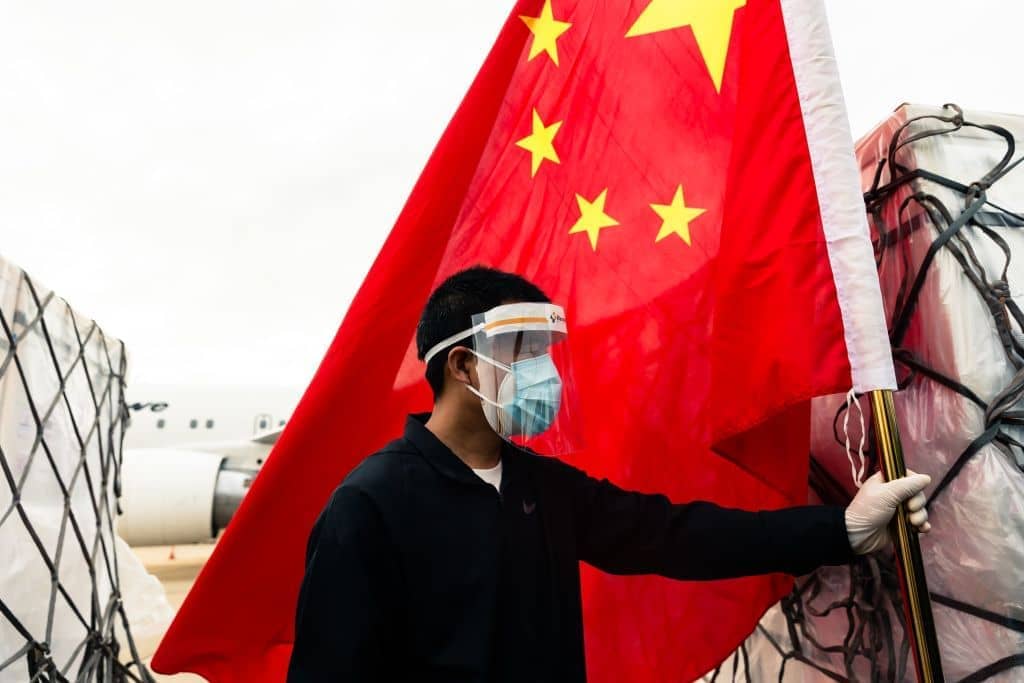Britain’s top spy chief Richard Moore warned this week of the growing threat that China poses to the West. Besides the risk of cyber-warfare, the Communist country has been pumping huge sums across the globe as part of its Belt and Road strategy. Now, the EU has hit back: announcing a rival to the initiative to counter Chinese influence in Africa and elsewhere. Brussels’ ‘Global Gateway’ looks at how the EU can leverage billions of euros, taken from member states, financial institutions and elsewhere, to rival the Belt and Road initiative. Unfortunately, it’s too little, too late.
During the years I spent working in Africa, I saw first-hand how widespread and all-encompassing China’s Belt and Road initiative is. Over one million Chinese citizens have migrated to Africa over the last two decades. This large-scale movement of people has increased Chinese political and economic influence and has been encouraged by Beijing.
Cameroon’s commercial capital, Douala, shows the impact of this mass migration: the city’s ‘Great China Market’ has grown from a handful of Chinese stalls in the late 1990s to a network of thousands of traders. This is far from the only sign of Chinese influence on the continent: everywhere in Africa, the red petal logo of the Chinese telecoms giant Huawei can be seen. I travelled through new airport terminals funded by Chinese loans and built by Chinese companies. One evening, sitting by the side of a swimming pool in Ethiopia, I spoke to an aid worker whose flight from the Democratic Republic of Congo (DRC) had been filled with Chinese passengers, most of them connected to the mining industry. The DRC, whose natural resources were a source of Cold War competition, is now the centre of global cobalt production. Last year, 70 per cent of the world’s cobalt came from the DRC. The element is used to keep lithium-ion batteries from catching fire. These batteries power everything from cell phones to electric cars. Some 40 per cent of the mining in the DRC is controlled by Chinese companies.
To counter this image, China is using its soft power to win hearts and minds
The West who, until very recently, allowed the Chinese intimate access to some of its most sensitive industries, is guilty of taking its eyes off the ball. And a shoddy EU initiative doesn’t make up for lost time. As part of the Belt and Road scheme, between 2006-2017, Chinese mineral investments in Africa hit $33 billion (£25 billion), dwarfing investments from Western companies.
In countries where China is securing mineral deals, they are delivering infrastructure projects to support the extraction of raw materials and the importation of Chinese goods. This includes the airports that I passed through, thousands of miles of highways, railways in Kenya, Nigeria and Ethiopia which connect inland mineral deposits with ports, and mega-ports in Tanzania and Djibouti. It also includes more than 40 national stadiums, presidential places and government buildings which stand as highly visible reminders of Chinese benevolence. These projects are paid for by Chinese loans and delivered by Chinese companies.
For China, the aim of these projects is simple: president Xi Jinping sees himself as a long-term, meritocratic (non-democratic) leader, leading through a blend of Marxism and nationalism based on Confucian values. This leadership, he hopes, will deliver a society of harmony and ‘order’ that provides a relatively well-off life (xiaokang) to its people.
Xi needs Africa to deliver this vision. The continent’s raw material extraction is vital for fuelling the fourth industrial revolution, and access to Africa’s markets will keep China’s economy growing and its people well-off. Xi also seeks recognition for China and to erase the memory of the humiliation of European colonisation.
Although China portrays its Belt and Road initiative as a win-win, the reality is rather different. The quality of some of the infrastructure projects it funds leaves much to be desired. And the vast debts built up to deliver the projects (China holds more than 70 per cent of Djibouti’s national debt) has the appearance of a ‘debt-trap’ aimed at ensuring the grip of Chinese influence.
To counter this image, China is using its soft power to win hearts and minds. During the pandemic, China sold and donated vaccines to 13 African countries, mostly those where they had existing economic ties. China has also been investing in African media. Since moving its regional office to Nairobi, the Chinese state-run Xinhua News Agency has built one of the largest correspondent networks on the continent. Chinese state TV, radio and China Daily’s Africa edition now have offices in Nairobi.
As a response to the Belt and Road initiative, the EU’s Global Gateway is naïve. It underestimates the scale of China’s investment and exaggerates the lure of Western democratic values. African states do not want another’s dream to follow. They want links not further dependencies. The failure of developed nations to properly support vaccine roll outs in the developing world has been blamed for the emergence of the Omicron variant. This should serve as a reminder that what unfolds in Africa has the potential to affect us all.






Comments